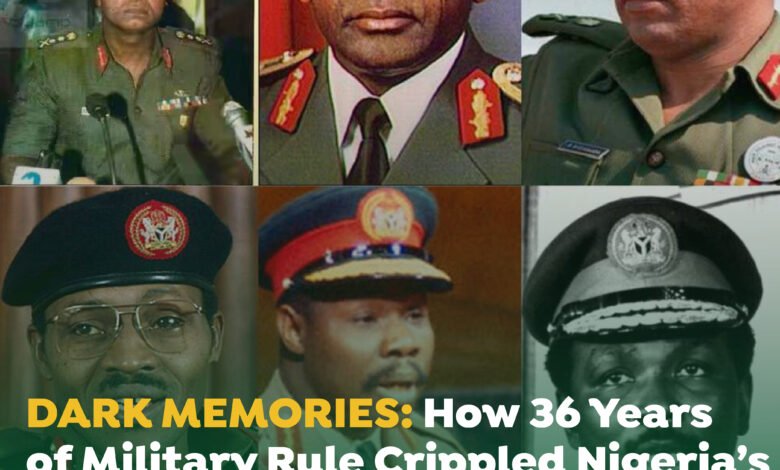DARK MEMORIES: How 36 Years of Military Rule Crippled Nigeria’s Unity and Prosperity

As misguided calls for a “military takeover” and the flying of Russian flags in some Northern states gain traction, the horrific images of more than three decades of military interference have dominated the conversation, beginning with the bloody January 15, 1966 coup.
Founding fathers murdered in cold blood
On that fateful day in Lagos, then the federal capital, a group of young and ambitious military officers, led by Major Chukwuma Kaduna Nzeogwu, launched a surprise attack on the Ikoyi residence of Prime Minister Alhaji Abubakar Tafawa Balewa.
In a brutal and senseless act, they gunned down the Prime Minister, marking the beginning of a dark era in Nigeria’s history.
In Ibadan, the Western region capital, the Premier, Samuel Ladoke Akintola, after several resistances, was murdered. In Kaduna, the regional capital of the north, the Premier, Alhaji Ahmadu Bello, was executed.
From Coup to War
As the First Republic ended, what started as an attempt to end corruption and bad governance would later plunge the nation into a 30-month-old brutal and avoidable war, disrupting the vision of our founding fathers.
Meanwhile, as the dust of the coup settled, Johnson Thomas Umunnakwe (JTU) Aguiyi-Ironsi, the first black man to lead a UN peacekeeping mission, was selected to lead the country. He ruled briefly, for six months, before he was assassinated in Ibadan alongside Adekunle Fajuyi, the first military governor of Western Nigeria, on 29 July 1966.
While in office, JTU Aguiyi-Ironsi cracked down on activists, clamped down on journalists, and proclaimed controversial decisions; one of them, the unification decree 34, transferred all the autonomous power of the four regions to the center. The decree exacerbated anti-Igbo riots in the north. In the interim, a counter coup was staged, thus ending Aguiyi-Ironsi’s time in office.
Guns derail a nation’s dream
As the news of the demise of JTU Aguiyi-Ironsi spread to the rest of the nation, the reaction in the north, the majority of whom had suspected the selective execution of notable Nigerian leaders in 1966 sparked another round of tension.
Meanwhile, Colonel Yakubu Gowon, just 27 years old, took power, which was unwelcome to Chukwuemeka Ojukwu. This led to rising ethnic tensions, which quickly escalated into violent tribal clashes.
On May 30, 1967, Ojukwu declared the Biafra Republic, leading to a civil war that lasted 30 months and claimed more than 2 million lives.
By 1975, Yakubu Gowon’s government, lost in direction, was also toppled by General Murtala Muhammed, who spent 200 days in office before he was killed by Bukar Suka Dimka in 1976.
Following his death, General Olusegun Obasanjo, his deputy, took over and later transferred power to the first democratically elected president, Alhaji Shehu Shagari, in 1979.
’36 years in the darkness’
Repression, detention, and extrajudicial killings became military rule trademarks. This is in addition to economic sabotage, imprisonment of critics, and confiscation of opposition properties; consequently, for the common man, life became brutish, solitary, and nasty.
Veteran journalists like Dele Giwa, Bagauda Kaltho, Kunle Agunloye, and Tajudeen Disu lost their lives.
Kudirat Abiola, Ken Saro-Wiwa, and 8 Ogoni activists were executed in broad daylight. Many others were harassed, intimidated, and locked in the gulag. Under IBB, for instance, the Nigerian economy, once a cynosure of all eyes, hit rock bottom with the adoption of the poisonous and ruinous World Bank Structural Adjustment Program (SAP).
‘Death Toll’
Nigeria’s military rule (1966-1999) was marked by devastating violence, including the civil war (2 million+ lives lost), political executions (500+), Maitasine riots in Kano (10,000+ lives lost, 1980-1985), and Ogoni crisis (4,000+ lives lost).
The Abacha regime’s brutality led to international sanctions. However, the return to civilian rule in 1999 helped restore Nigeria’s global standing.
As Prof. Wole Soyinka, himself a victim of military barbarity, once asserted, ‘Under a dictatorship, a nation ceases to exist. All that remains is a fiefdom, a planet of slaves regimented by aliens from outer space.’
Many historians note that though the allure of authoritarianism may seem appealing, it’s a recipe for disaster.





